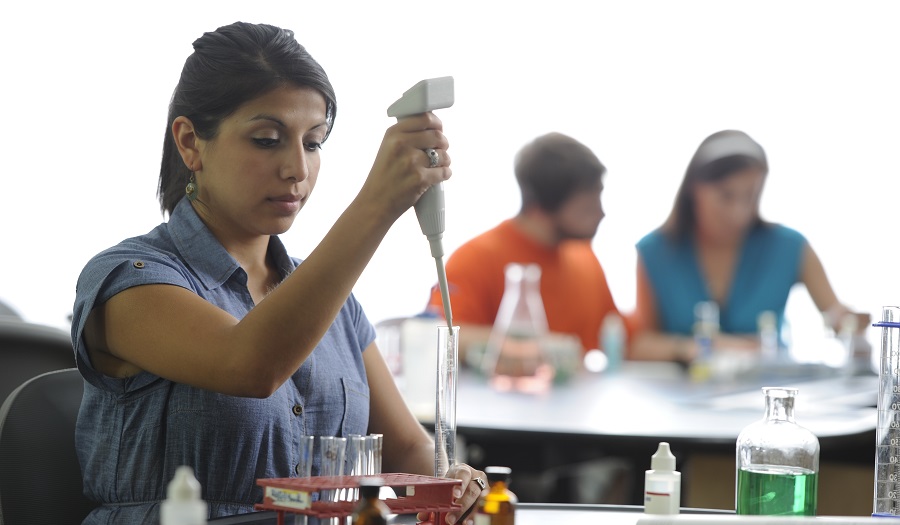Biomedical Science may be one of the best health care degrees you can get! An undergraduate biomedical science program gives you the unique opportunity to explore various scientific fields without having to commit to one career path before knowing what you enjoy most.
Your B.S. degree in biomedical science can be a gateway to working in many fields: education, research, sales, medical practice, and hospital and institutional work. Students also use this degree to pursue graduate study in the health professions to become a medical doctor, dentist, podiatrist, etc. In addition, this degree prepares you for the first-professional programs at National University where you can study to become a chiropractic or naturopathic physician or pursue the acupuncture or oriental medicine programs.
What is Biomedical Science?
Biomedical science (BS) is the foundation of knowledge for all health care professionals. It is a broad category of knowledge that includes any course of scientific study related to biology as it affects health care.
In a biomedical program, you’ll experience a variety of studies, including:
- Human anatomy and physiology
- Genetics
- Biochemistry
- Microbiology
- Nutrition
- Kinesiology
What is a Biomedical Science Degree?
A bachelor of biomedical science degree is a certification from a university that indicates the student completed an undergraduate program providing a broad education in biomedical science.

From there, undergraduates may continue their education, pursuing a specialized degree in different fields, or start searching for work using their undergraduate degree. There are numerous jobs you can get with a biomedical sciences degree, which we will cover later.
An undergraduate biomedical science degree from an accredited university is surprisingly versatile and can prepare you for a broad range of jobs and post-graduate educational options.
What can you do with a biomedical science major? Not only can a bachelor of science degree in biomedical science be a stepping stone to a traditional medical school, it also opens the doors to an increasing number of careers in medical research, nutrition science, and biomedical engineering.
Why Get a Biomedical Science Degree?
First, the breadth of study. No other degree combines basic science courses such as microbiology, physiology and chemistry with medical courses like pathology, pharmacology and immunology. Some programs even allow you to build a customized curriculum by choosing the courses you want to focus on.
Second, a bachelor’s degree in biomedical science opens doors to careers in the fields of science and medicine, as well as jobs that combine both areas of interest. Biomedical science jobs for new graduates are relatively plentiful. Also, biomedical job salaries can be significant.
Health care jobs are projected to grow much faster over the next decade than other fields. So, a biomedical degree is a smart choice that can result in strong future biomedical science salary potential and career flexibility.
Biomedical Science Careers You Can Get with a Degree
There are many jobs with a biomedical science degree or equivalent requirement before you can take them. Here are a few career options for biomedical scientists that you could choose:
Forensic Technologist
To provide impartial evidence and testimony regarding crimes to legal officials, forensic technologists need to be well-versed in the analysis of bodily fluids, DNA, hair, etc. A biomedical science degree prepares you to study and practice forensic science because of the wide range of course offerings, including anatomy, physiology, and human genetics.

Pharmaceutical Sales
Pharmaceutical sales representatives don’t just sell medicine—they also teach prospective customers (typically physicians and nurse practitioners) about the scientific properties of various drugs, how they function in the body, and how they effectively treat illness. In short, pharmaceutical professionals need to understand the science behind the products they sell. A bachelor’s degree in biomedical science is the perfect precursor to what can be a lucrative sales career.
Health Policy
A degree in biomedical science is a great stepping stone to a graduate degree in health policy because of its emphasis on understanding the complexities of human health from a variety of disciplines such as pathology, nutrition, and immunology. Those with a Masters of Public Health are in a position to establish changes in health policy at the local, state, and national levels.
Toxicology
Among science careers, toxicology is perhaps the most diverse. According to the American Chemical Society (ACS, this is because toxicology combines different fields of study, including biology, chemistry, pharmacology, medicine, and nursing, to assess the safety and biological effects of drugs, chemicals, agents, and other substances on living organisms. Toxicologists with biomedical science undergraduate degrees can expect to spend most of their time in laboratories, while those with higher-level degrees might work in offices planning experiments and interpreting data.

Dentistry
Aside from medical school, a bachelor of science degree can be a stepping stone to other medical degrees such as a Doctor of Dental Medicine (DMD) or a Doctor of Dental Surgery (DDS). Some dental schools even have departments of biomedical science in which they research and teach everything from the role of genetics in oral development to oral tissue engineering and regeneration. A bachelor’s degree in biomedical science can put you ahead of the game when it comes to mastering the complexities of dentistry.
Biomedical Researcher
The field of biomedical research continues to grow at a rapid pace. In December 2016, Congress passed the 21st Century Cures Act to help advance innovation in biomedical research, spending $6.3 billion on medical research initiatives. This means job opportunities for biomedical science graduates include options to work in research hospitals, universities, labs, and other research institutes. The varied nature of coursework in a biomedical science degree allows you to pursue research on the topics that interest you most.
Zoologist
Believe it or not, a biomedical science degree can prepare you for further study in the field of zoology. Although most people who study biomedical sciences go on to work in fields related to human biology, the emphasis on basic biology, as well as drug research, development of diagnostic techniques, naturally occurring antimicrobials, and so on apply to the rest of the animal kingdom as well.
What to Look for in a Biomedical Science Program
Biomedical science undergraduate programs include basic science classes such as microbiology, physiology, anatomy, epidemiology, biochemistry, nutrition, and kinesiology. At NUHS, you’ll also take neuroscience, histology, nutrition, immunology, embryology, and more to further develop your knowledge and skills. You’re also free to choose any of our 40+ biomedical science courses to develop a curriculum that will specifically fit your future plans, whether that’s to pursue a degree as a medical doctor or practice a certain health care specialty. You can even pursue an Emphasis in Nutrition to open up more career opportunities.
The Biomedical Science Program at National University of Health Sciences (NUHS)
As you can see, there are many job opportunities for biomedical science graduates. NUHS offers a completion program designed for students who have already begun their college education and need to finish their degree. The NUHS Bachelor of Biomedical Science program allows you to select from more than 40 classes to develop a curriculum that will specifically fit your future plans. This kind of flexibility, plus the opportunity to learn from professors from a variety of fields of expertise, sets National University’s biomedical sciences degree apart from many others.
{{cta(‘5771641f-24a4-496d-9f28-7f6adf858fb1’)}}




0 Comments